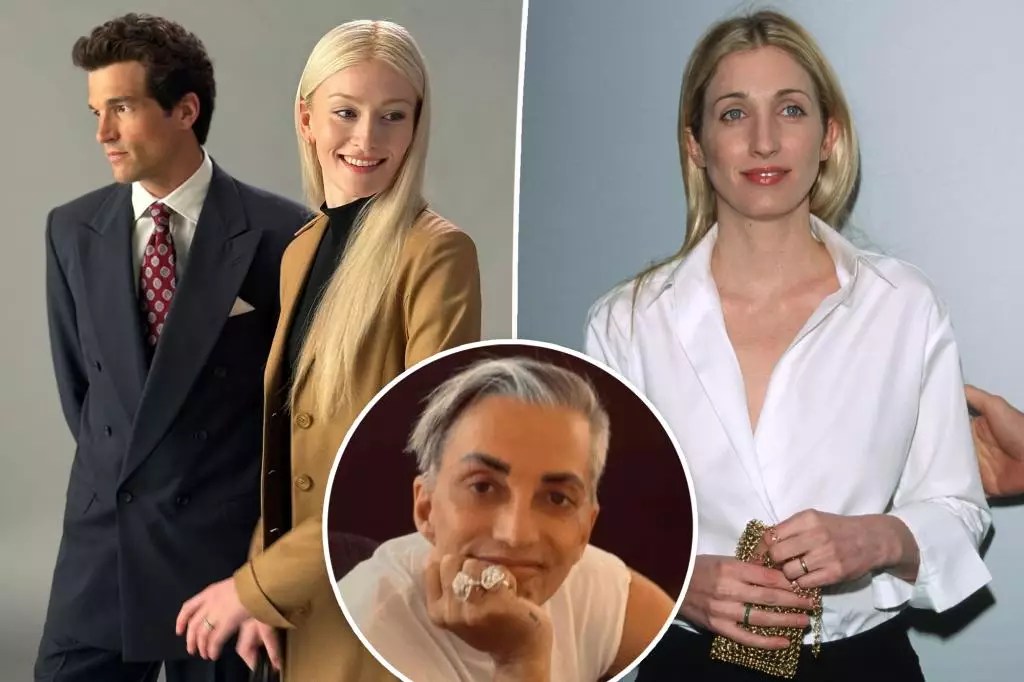Carolyn Bessette-Kennedy is often remembered not only as the wife of John F. Kennedy Jr. but also as a timeless icon of style and elegance. As Ryan Murphy gears up to release the FX show American Love Story, focusing on the lives of this iconic couple, fans are buzzing with anticipation—and skepticism. A recent glimpse of Sarah Pidgeon in character revealed a portrayal that fans felt sat strangely against the glamorous image they cherished of Bessette-Kennedy. Dressed in a drab camel overcoat with an ill-fitting Hermès Birkin bag, Pidgeon’s look has been labeled both “sad” and a far cry from the sophisticated woman everyone remembers.
The immediate backlash sparked conversations about the importance of authenticity in portraying such beloved figures. Carolyn, a former publicist for Calvin Klein, wasn’t just known for her relationships but for her impeccable taste in fashion and her ability to exude confidence without extensive makeup. Critics saw the first look not as a homage but rather as a misunderstanding of the very essence of Carolyn’s character.
The Hair Controversy
One of the most discussed aspects of the initial portrayal was Carolyn’s hair—a critical element of her signature look. In a revealing interview with Page Six Style, Brad Johns, the hair colorist who gained fame for turning Bessette-Kennedy’s locks into an ensemble of buttery blond hues, expressed his dismay at the styling choice in the series. He insisted that Carolyn’s hair was not only light but also vibrantly styled, with carefully placed highlights that broke the monotony and added depth.
Johns vividly recollected their first meeting, reflecting the mutual trust between stylist and client. The artistic demands of transitioning Bessette-Kennedy’s hair required a nuanced approach; a single visit wouldn’t suffice to achieve the desired look, which is emblematic of the meticulous artistry within the fashion realm. This discussion about hair doesn’t merely scratch the surface of character depiction—it invites a broader conversation about authenticity in fashion representation, a vital topic in today’s entertainment landscape.
A Conversation About Authenticity
Murphy’s artistic endeavor in creating American Love Story raises questions about how closely one must adhere to historical accuracy versus creative interpretation. When he responded to backlash regarding the initial photos, he used the phrase “work in progress,” indicating a perhaps tentative approach to establishing Bessette-Kennedy’s iconic style. He acknowledged the importance of understanding not just the characters’ aesthetics but also their impact on culture.
To quell concerns, he went so far as to invite a group of fashion bloggers dedicated to Bessette-Kennedy’s style to view the wardrobe and even mentioned that an advisory committee would be advising the production. While Murphy’s intentions appear genuine, fans and critics alike are left discerning whether this is a sincere effort to celebrate Bessette-Kennedy’s fashion legacy or merely a tactic to defuse criticism.
The Influence of Celebrity Styling
The legacy of Carolyn Bessette-Kennedy continues to resonate beyond her life and remains significant in modern discussions of celebrity culture and the fashion industry. The influence of her style persists as a benchmark for chic minimalism and understated elegance. Young women today still look to her wardrobe choices as examples of timeless fashions that avoid excessive trends.
The dilemma presented by her portrayal also emphasizes the complexities surrounding how iconic women are represented in media. When stylists or producers miss the mark, the misrepresentation signals a disconnection not just from the subject’s aesthetic but their impact on broader culture. Carolyn Bessette-Kennedy was an embodiment of sophistication—a figure who transcended her lineage through an innate sense of style, and it is this very essence that shows the critical importance of authenticity when depicting such influential characters.
A Cultural Reflection
Moreover, addressing the stylistic elements in film and television reflects larger societal values. Bessette-Kennedy’s specific style choices represented an era of fashion that celebrated individuality and effortlessness, values that remain highly relevant today. As many people still seek recognizable anchors in a sea of fast fashion, the significance of portraying influential figures accurately is paramount.
As Ryan Murphy and his team navigate the waters of public expectation and artistic license, one wonders whether future projects will adopt a more responsible stance toward celebrating genuine influences in fashion. Carolyn Bessette-Kennedy was not only an icon; her life’s story intertwines with historical narratives, and it is incumbent upon storytellers to honor that legacy with both respect and accuracy. Fashion is and always has been a reflection of one’s identity and aspirations, making the portrayal of style icons an essential part of narrating their stories.


Leave a Reply